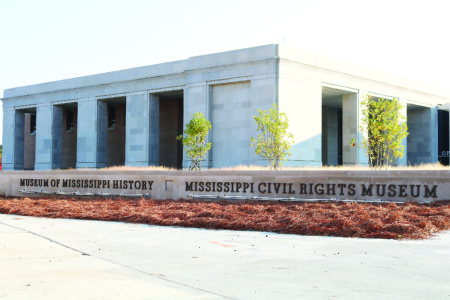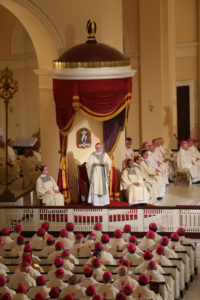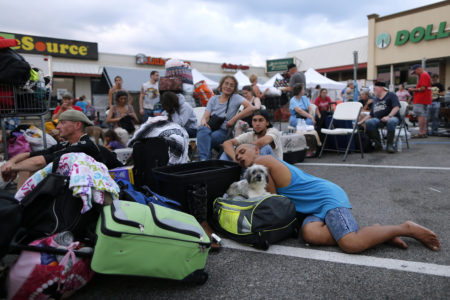By Maureen Smith
JACKSON – A pair of new museums set to open Dec. 9-10 in Jackson will tell the story of Mississippi and of the Civil Rights movement here – including the role the Catholic Church played in the movement. The Diocese of Jackson has sponsored an exhibit in the Civil Rights museum.
The Museum of Mississippi History takes visitors back to the earliest days of this land, including the stories of the Native Americans who hunted and traded here. The exhibits run all the way through the devastation of Hurricane Katrina. The Mississippi Civil Rights Museum zeroes in on a 30-year period in history, 1945-1976, when the state was at the center of the Civil Rights Movement to gain civil liberties and equal rights for African Americans. The Civil Rights Museum is the first state-sponsored museum of its kind in the United States.

JACKSON – The exterior of the two museums sitting side-by-side in downtown Jackson. (Photo by Tereza Ma)
“In the early stages of the two-museums project, Bishop Joseph Kopacz asked Bishop Emeritus Joseph Latino and me to meet with Former Governor William Winter, Kane Ditto, former mayor of Jackson; and Trey Porter, director of development for the Mississippi Department of Archives and History (MDAH); to discuss how the diocese could be a part of these two museums,” said Mary Woodward, diocesan chancellor. “Because of the church’s connection with the history of the state, especially in the Civil Rights Movement, Bishop Kopacz and Bishop Emeritus Latino believed the diocese should be integrally involved.”
Ultimately, the diocese offered to sponsor one of the permanent exhibits focusing on the Sovereignty Files as a gift to the State of Mississippi to mark the bicentennial. “We chose the Sovereignty Files exhibit because many of our Catholic clergy and faithful are included in the files that were kept by the State Sovereignty Commission, created in 1956, to maintain tabs on ‘subversives and outside agitators,’” Woodward continued. “The objective of the commission was to preserve segregation under the guise of defending sovereignty from interference by the federal government. Basically, the commission became a spy agency for the State of Mississippi in a time when segregation was beginning to be challenged publicly. Priests were followed, and citations in the files reflect various clergy and lay Catholics attending gatherings at Tougaloo College and being active in speaking out for civil rights and against racism,” Woodward added.
“It was a scary time; I even found my father’s name in the files, which are available online through the MDAH web site. These files show how racism was a state-sponsored system. As Catholics, we should be very proud of how the church stood for justice in a very difficult time in our country’s and state’s past. Hopefully, this will inspire us to continue to speak out and work for justice, because as we have seen over the past year, racism still is just below the surface,” Woodward concluded.
The diocesan office is not the only contributor to the effort, Valencia Hall of Natchez Holy Family Parish, is on the board of trustees for the Mississippi Department of Archives and History and for the two-museum project. She came of age during the movement and her family participated in a key moment in Natchez’ Civil Rights history.
She said she has been delighted to watch the project rise up from a hole in the ground.
She recalls her pastor, Father William Morrissey, SSJ, was on many watchlists. “I remember Father Jonathan Doyle, who was an associate pastor, and Father Morrissey were in fear for their lives sometimes,” said Hall. Morrissey was the first white officer in the NAACP. During his time in Natchez, he allowed the NAACP to meet at the parish, sponsored integrated youth gatherings and spearheaded the integration of Catholic schools in Natchez at the urging of then Bishop Richard Oliver Gerow.
“Father Morrissey asked my parents to enroll us in Cathedral School to integrate the school,” said Hall. “I found out later that Bishop Gerow picked the families he wanted to approach so not too many families would integrate at one time,” she added. Hall and her sister left Holy Family, an all African-American school, to attend the all-white Cathedral. After a year, the pair did not want to return, but their parents insisted.
“I think it was the best decision for our education. It introduced us to people of different economic backgrounds and people of different color,” said Hall. She still laments that the effort was not reciprocal. No white students were asked to integrate Holy Family school.
The efforts of the Hall family did have an impact she herself can attest to. “I made a friend there – she and I will be friends until the day we die,” said Hall. Every day at recess, Hall and her friend would have to wait before they could play together. Her friend’s mother made a habit of walking to the playground at recess time to make sure her daughter was not playing with the black children. Once the mother left, Hall and her friend could play. Hall grew up and went away to school, eventually returning to Natchez.
“When I came back in 2001, I was at a celebration at St. Mary’s and my friend’s parents were the first to come up to me. Her mother gave me a huge hug. They embraced me and welcomed me home, and I thought, ‘this can’t be the same mother,’” she said. “That was a profound moment for me as an adult. They literally embraced me and I knew I could – I had – forgiven her.”
Hall said the exhibits in both museums are powerful. “This will be emotional for some people. They will look and ask why this is here, why do we have to look at it. The why is because of the profound impact of the Civil Rights Movement on the state and the nation.” Hall said the artifacts pull no punches. They include burned crosses and a lynching display. Some parts, however, recall the hope and progress the state has made. “Where the light shines in from the skylight, and you can hear ‘This Little Light of Mine’ playing. It’s wonderful,” she added.
She is delighted that the diocese supported the project and thinks the sovereignty exhibit is the perfect one to sponsor given the true nature of the church’s role in the movement. “The greatest contribution of the diocese is that we (the church) fought for the integrity and equality for all people.”
The museums are located in downtown Jackson. Details on tickets and hours are available on the website: https://give2mississippimuseums.com


 Our Lady of Guadalupe Silver Rose Pilgrimage has been a tradition for 57 years and was started by a youth group associated with the Knights called the Columbian Squires in 1960. Six Silver Roses travel different corridors in the Western, Central and Eastern portions of North America, with Knights hand-carrying each in specially constructed boxes. Two of the six roses will end their journey at the Shrine of Our Lady of Guadalupe in Monterrey, Mexico, on December 12th, the Feast Day of Our Lady of Guadalupe. (Photo by Gene Buglewicz)
Our Lady of Guadalupe Silver Rose Pilgrimage has been a tradition for 57 years and was started by a youth group associated with the Knights called the Columbian Squires in 1960. Six Silver Roses travel different corridors in the Western, Central and Eastern portions of North America, with Knights hand-carrying each in specially constructed boxes. Two of the six roses will end their journey at the Shrine of Our Lady of Guadalupe in Monterrey, Mexico, on December 12th, the Feast Day of Our Lady of Guadalupe. (Photo by Gene Buglewicz)